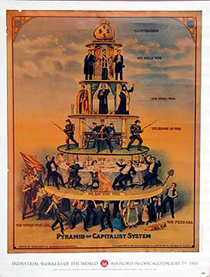One Republican President Who Actually Served in War and knew when a war was unwinnable.
Deserves to be widely circulated and read: Op-ed From the Los Angeles Times
Remember the guy who warned us about the Military Industrial Complex?
The potential for the disastrous rise of misplaced power exists and will persist. We must never let the weight of this [military industrial complex] endanger our liberties or democratic processes....Only an alert and knowledgeable citizenry can compel the proper meshing of the HUGE industrial and military machinery of defense with our PEACEFUL methods and goals so that security and liberty may prosper together.
Being more like Ike
The 34th president and ex-general delivered eight years of peace because he knew when a war was unwinnable.
By Michael Korda
August 20, 2007
It may be possible to forgive a president for failing to understand the present or to foresee the future, but it is harder to forgive a total lack of interest in the past.
The Bush administration has displayed a peculiar disinterest in previous Republican presidencies, from which there is much to be learned. The president's own father set a good example of knowing when to stop, as when he took the wise step of not advancing to Baghdad. Ronald Reagan proved the immense power of soaring rhetoric. Richard Nixon, if nothing else, provided an object lesson in the perils of continuing to wage an unpopular war. But it is, above all, Dwight D. Eisenhower to whom Republicans should be looking for sound political wisdom these days.
Part of Ike's great popularity stemmed from his 1952 campaign promise, if elected, to go to Korea and see for himself what was happening. This infuriated Harry S. Truman, who said that if Ike had a plan to end the war it was his duty to give it to the president. Ike ignored him, went, saw and, with the keen eye of a five-star general, surveyed the forbidding terrain. This war wasn't winnable, he determined, at least not without using atomic weapons, not as long as the Chinese were willing to keep on fighting.
Eisenhower understood that if you can't win a war, the faster you get out of it the better.
He came home and ended the Korean War in about six months with an armistice that is still in effect today. In short, he understood that if you can't win a war, the faster you get out of it the better. He answered criticism from the right wing of his own party by remarking simply, "The war is over, and I hope my son is going to come home soon."
Ike had successfully commanded Operation Torch, the invasion of North Africa; Husky, the invasion of Sicily; and Overlord, the Normandy invasion; and served as supreme commander of the Allied forces in Europe and, later, as the first supreme commander of NATO. But like Ulysses S. Grant before him, he believed firmly that American forces should never go to war without a military strategy for victory, the logistics and troops needed to win, and a supreme commander with absolute authority.
In Ike's view, if a general got what he asked for and couldn't produce victory, he should be fired. But under no circumstances should he be asked to follow a strategy produced "by committee" or be micromanaged by the Pentagon or White House. Ike's orders for Overlord simply began: "You will enter the continent of Europe and in conjunction with the other united nations, undertake operations aimed at the heart of Germany and the destruction of her armed forces." The rest was up to Ike.
What's more, it was his conviction that a supreme commander must have unified command of land, sea and air forces of all allied nations; for example, during World War II, when the "bomber barons" of the U.S. and Britain tried to keep control of their heavy bombers, Ike threatened Winston Churchill that he would resign his command and go home. They gave in.
In short, Ike understood the use of force. (And not just in war. He also memorably sent troopers of the 101st Airborne Division in full combat gear, instead of U.S. marshals in suits, to integrate Arkansas public schools.)
Trying to hold a country the size of Iraq in the middle of a civil war with 160,000 troops would have seemed to him absurd. If you need to use force, you should have enough of it to do the job quickly and completely. Then get the troops home and leave the rest to the politicians and diplomats. That was the American way of war, as Ike and Grant saw it.
Ike was shrewd enough to avoid getting entangled in France's war in Indochina. "No one," he said, "could be more opposed to ever getting the United States involved in a hot war in that region than I am." As for the Middle East, Ike offered prescient words: the United States had no business transforming itself into "an occupying power in a seething Arab world," and if it ever did so, "I am sure we would regret it."
There is a reason why Americans "liked Ike." As one of America's greatest generals, he delivered some of the nation's most crucial military victories. Then as president, he delivered, among other benefits, eight years of peace. (The second volume of his presidential memoirs is titled "Waging Peace.") No man elected president, except perhaps Grant, knew better how to wage war -- or understood the basic common sense of never getting into a fight you can't win, or getting into one you can't get out of.
Maybe it's time for somebody in the White House (and in the Pentagon) to read Eisenhower's "Crusade in Europe" and learn something about command and strategy from a great Republican.
Original source: http://www.latimes.com/news/opinion/commentary/la-oe-korda20aug20,1,4116386.story
Technorati Tags:
military industrial complex, Korean War, Eisenhower, LA Times, Michael Korda, Ike
Labels: iraq war, republicans







0 Comments:
Post a Comment
<< Home